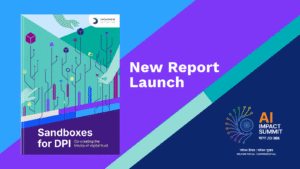The Caribbean DPI Summit, held in Kingston, Jamaica from April 8–10, 2025, brought together government leaders, civil society representatives, technologists, researchers, and regional organizations to explore how DPI can serve as a foundation for inclusive, resilient, and people-centered digital transformation across the Caribbean. Organized by the University of the West Indies and Co-Develop, in partnership with the Mona School of Business and Management, the Inter-American Development Bank (IDB), the Caribbean Telecommunications Union, D4D.net, and the Caribbean Open Institute, the Summit was a space for honest conversations and collective visioning around the region’s digital future.
Mariana Rozo-Paz, Policy, Research and Project Management Lead at the Datasphere Initiative, joined the event to contribute insights on inclusive governance approaches and highlight the importance of safe, collaborative spaces, such as sandboxes, for experimenting, testing, and scaling DPI efforts. This blog captures her key reflections and takeaways from three days of dialogue, exchange, and regional momentum-building.
“If you want to go fast, go alone. If you want to go far, go together.”
This African proverb echoed throughout the three dynamic days of the Caribbean DPI Summit in Kingston. It was a constant reminder that the journey toward effective, inclusive, and scalable Digital Public Infrastructure (DPI) is not one to be undertaken alone. Leaders from across the region and beyond came together to advance a shared agenda for responsible digital transformation. The Summit emphasized collaboration over competition, collective learning, and the need to build trust as a foundation for the future of DPI. Here are five key takeaways:
1. Cooperation over competition: moving together as a region
DPI is not a solo sprint, it’s a team marathon. Caribbean countries are uniquely positioned to learn from each other, adapt regional models, and co-create solutions that reflect shared histories and cultural contexts. It was inspiring to see regional actors choosing cooperation over competition, exchanging hard-earned lessons and building political will together. This kind of regional alignment is crucial for achieving interoperable, people-centered DPI ecosystems that serve mobile populations and shared development goals, especially as the region faces common challenges like climate change, migration, and resilience.
2. DPI is not the future, it’s the foundation
Often framed as “tech for tomorrow,” DPI is, in fact, foundational infrastructure. From civil registration to social protection, from digital IDs to payment systems, DPIs are the invisible scaffolding that can strengthen institutions, foster responsible innovation, and improve public service delivery today. The conversation in Kingston made it clear: DPI is about getting the basics right and scaling from there. It also reminded us that DPI is not just a technical layer, it’s a societal one. When designed with equity in mind, DPI can unlock access to rights and services for those historically left behind, acting as a public good that reinforces democratic values.
3. DPI moves at the speed of trust
Trust emerged as a major theme. Without it, even the most advanced tech fails. Today, we face mistrust between governments and citizens, and between public and private actors. Building DPI that protects rights, preserves privacy, and delivers real value requires not just technical expertise, but also long-term trust-building efforts. And as various participants echoed, “DPI moves at the speed of trust.” This means being transparent about how DPI systems are built, governed, and evaluated, and ensuring communities have a real voice in shaping them. DPI must earn trust through accountability, not just usability.
4. We must bridge the gaps and break the silos
Policy experts, technologists, academics, and practitioners often work in silos, missing the chance to connect insights to implementation. The summit highlighted the need to create more intentional spaces for dialogue and joint problem-solving, where research can inform action, and action can inform research. Building effective DPI demands these bridges, so that digital inclusion isn’t just a goal but a practice embedded in each step, from design to deployment. Collaboration across disciplines also ensures DPI is grounded in context, not just open code.
5. We need safe spaces to build together
To turn these ideas into reality, we need more than just goodwill. We need safe, structured spaces for collaboration, and we need to do it quickly. We want to go together, but we need to go fast. That’s where sandboxes come in. Sandboxes offer a real-world testing environment to explore interoperability, governance, inclusion, and user trust. What would happen if we designed a cross-border Caribbean DPI sandbox? A space where countries could experiment with solutions, share knowledge, and test interoperability across borders. Sandboxes create room to fail safely, learn quickly, and iterate responsibly, a critical ingredient in the journey to scale DPI that truly works for everyone.
Kingston left attendees energized and hopeful. The DPI movement is growing—and if this forum was any indication, the Caribbean is ready not just to adopt DPI, but to lead the way in doing so responsibly, collaboratively, and with trust at the core.
Read more about the Datasphere Initiative’s work at the intersection of DPI, trust, and sandboxes.




